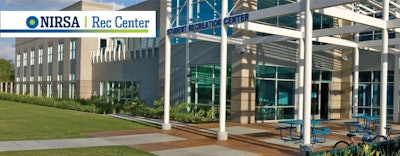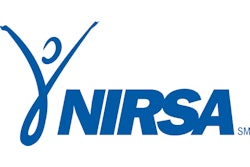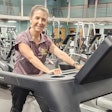
Campus recreation administrators spent the summer seeking the safest and most feasible ways to meet student needs in the midst of the coronavirus pandemic, which already has shuttered in-person learning at some institutions this fall.
"We will find that our students, like many of us, have been traumatized by the events of the past six months," warns Mary O'Mahoney, director of the Student Recreation Center at California State University, Bakersfield.
That means the role of campus recreation this fall will be more crucial than ever, even as programming becomes more challenging to deliver. From creating virtual opportunities after campuses shut down in spring to implementing strict protocols upon reopening, recreation professionals are key players in rebooting campus life.
"Being active has positive effects on our immune systems, which helps our bodies respond to the effects of viruses and other stresses on our bodies and minds," says David Bowles, senior director of recreational sports at the University of Florida. "Collegiate recreation programs must focus on impacting student success and meeting the mission of the university. We must adjust our mindsets."
Four schools, four strategies
Cal State Bakersfield, as part of the 23-school California State University system, has announced it will be virtual this fall for all but lab and other hands-on classes, and fewer than 230 students will live on campus.
The Student Recreation Center is still closed, but O'Mahoney says that when it reopens individuals entering the facility — including staff members — must show a "clear to proceed" text that indicates they've successfully completed an online screening questionnaire. Then, using the FusionGO mobile app, they will be able to reserve one-hour time slots. Patrons are expected to wash their hands, wear a face covering, wipe down equipment before and after using it, and maintain social distance.
"We think our capacity will be 40 patrons, plus staff," O'Mahoney says. "At the end of each hour, we will clear the building and do a cleaning and disinfecting of high-touch areas before allowing the next reservation block of people into the facility."
Plans also called for moving some cardio machines and strength training equipment to other areas of the building. "We don't want to damage our wood floor [in the gymnasium] by putting heavy equipment on it, and we are learning that even with mats for protection, there is a chance for damage and discoloration," O'Mahoney says. "We do have a multipurpose activities court, where we will put the heavier weight equipment. It is important for us to provide as normal of an environment as possible for students."
When the Student Recreation Center at Texas A&M University reopened in mid-May, the number of patrons permitted in specific areas was limited, but it has increased. Many pieces of equipment are designated as unavailable in compliance with social distancing guidelines, and the number of users allowed in the pool, on indoor climbing structures and on various courts also is limited, according to Rick Hall, director of recreational sports at A&M.
In early summer, group exercise classes were offered virtually, as were select intramural sports. By mid-summer, outdoor water exercise classes, outdoor bootcamps and some in-person intramurals were added to the schedule, including basketball skills competitions such as 3-point shooting contests and H-O-R-S-E, plus cornhole, badminton and table tennis.
The only constant has been cleaning and disinfecting. "That is done by both our staff and the custodial staff," Hall says. "Our staff also wear facemasks, sneeze guards have been installed and hand sanitizer is available. We are not accepting cash, and no guest passes will be sold. And we are putting together multiple scenarios in order to be able to respond as quickly as possible to changing conditions."
Campus recreation facilities also are open at the University of Florida, although they too operate at a considerably lower capacity than normal. Locker rooms are closed, and basketball and volleyball are among the unavailable activities.
"Participants in all activities must wear a face covering at all times, including while exercising," Bowles says. "Each person entering the building is greeted by a staff member who ensures a face covering is being worn properly, asks if any of a list of symptoms has been experienced in the last 48 hours or if they have come in contact with someone who has had a positive test result in the last two weeks, and uses a remote thermometer to confirm the person does not have a fever."
The LINC Recreation & Wellness Center at Lincoln University, which partners with the Jefferson City, Mo., Parks, Recreation and Forestry Department to provide services for both the campus community and local residents, has been operating in some capacity since early May after shutting down in mid-March. Initially, it reopened with modified hours, limited staff and designated times to evacuate and disinfect the facility. Group fitness classes are held outside or, in case of inclement weather, spread across four basketball courts in the gymnasium, according to Lincoln University dean for campus life Earnest Washington, who oversees the LINC with a member of Jefferson City's municipal staff.
In mid-summer, Washington couldn't predict how operations might change when students returned to the historically black university's campus in late August. Many of them spent the past several months in cities such as Chicago, St. Louis and Kansas City, where the number of positive coronavirus cases was considerably higher than in Jefferson City.
"Are we ready to go? No. Are we comfortable yet? No. Are we ready to move forward, uncomfortably? Yes," he said. "I don't see anything being 'normal' from here on out. We all have to establish what normalcy looks like now."
Peer support invaluable
Recognition among campus recreation leaders that they aren't alone in facing a new normal has helped them press on.
NIRSA established a wide-reaching series of free and on-demand virtual roundtables in March to help members navigate the uncharted waters of long-distance programming, and recreation directors in the Southeastern Conference began convening on Zoom every two weeks to discuss reopening procedures and other challenges related to COVID-19. "It has been extremely helpful to hear the experiences of my SEC colleagues," Bowles says. Insight from peers at other institutions has helped Hall, too, though he notes that proceeding safely through the fall and beyond will look at least slightly different on every campus.
One factor guiding Hall's strategy is his acknowledgement that "utilizing virtual platforms to deliver programming is likely here to stay, whether that's esports, online fitness classes, videos shared online or staff trainings through Zoom. Campus recreation professionals will need to determine the most effective ways to reach audiences that are not physically present in our facilities."
With all the uncertainties that remain about where campus recreation goes from here, O'Mahoney takes comfort in the fact that she's now better prepared for whatever comes next.
"When this all started to go down back in March, when facilities were closing and there were so many unknowns, I had some sleepless nights," she says, adding that recreation directors from all CSU campuses meet virtually every other week to share ideas and strategies. "But once I started talking to colleagues and we started putting together plans, I was less stressed. We will continue to be creative and innovative in order to meet students where they are and provide them with quality programming."
Campus Recreation and Black Lives MatterWhile all campus recreation professionals must rebuild their communities in the wake of the coronavirus pandemic, many — including those at the more than 100 historically black colleges and universities in the United States — also are reopening against the backdrop of a reinvigorated Black Lives Matter movement. "It could be a tough fall," admits Earnest Washington, dean of campus life for Lincoln University in Jefferson City, Mo., an HBCU campus established in 1854 with a current enrollment of about 2,500 students. The university's LINC Recreation & Wellness Center is shared with the city, where only about 19 percent of the population is Black, according to the U.S. Census Bureau. "The students who utilize the facility are Black, and a lot of the community patrons are white," Washington says. "But we've been blessed, because we haven't had any major racial confrontations." To help keep things that way, Washington and his municipal counterpart helping oversee the LINC, Aaron Grefrath (who happens to be white), plan to start a mentoring program for both students and young Jefferson City residents that would further establish the LINC as a welcoming environment for everyone. "We will be implementing initiatives to help bring the two communities closer together, because we need the city, and the city needs us," Washington says. "We're all here to support each other, and we want everyone to know that. I don't think we'll be able to start the program this fall, but it's something we will commit to this fall." Washington wasn't sure as of mid-summer what role campus recreation would play in the Black Lives Matter movement at Lincoln this fall. "I think whatever happens, it will be more of a university initiative than a campus recreation initiative," he says, adding that students organized a well-attended Juneteenth rally in one of the city's parks. "It's easier to support our students when they do things the right way." |
This article originally appeared in the September 2020 issue of Athletic Business with the title "Rebooting campus recreation during a pandemic." Athletic Business is a free magazine for professionals in the athletic, fitness and recreation industry. Click here to subscribe.





































